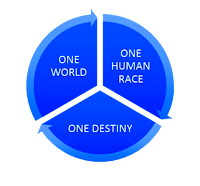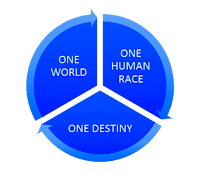CHILDHOOD PARENTAL SEPARATION - PERMANENT HOSTAGES TO BAD FORTUNE?
The bridge of time taking adults back to their childhood repeatedly, to make sense of the past and progress their lives.
Separations and losses can be horrendous for adults, such as when partners become separated from each other, through the ending of their relationship or death. In some cases, when partners become separated because one or both of them want out of the relationship, it result in one of them displaying signs of acute behavioural and psychological abnormality, such as being violent to their ex-partner, or self-harming.
So, if adults can become very seriously affected by separation and losses, what about children, who are, ipso facto, more vulnerable than their parents?
It is a commonly accepted fact that young children need to be cared for in stable, secure and loving family environments, in which they are encouraged to develop good, secure attachment and bonding with their primary care-givers or carers. In the child's infancy, this attachment and bonding process is facilitated with the physical interaction he/she has with their mother, through, eg, being suckled when they are hungry; being touched and comforted when they are distressed and crying. Similarly, the infant's father can promote his bonding and attachment with the child through being attentive to their needs, by comforting them, bathing and changing them, and putting them to sleep.
As the child grows older he/she provides the parents with addition opportunities to promote their mutual bonding and attachment, with play and speech acquisition and development opportunities being probably the biggest and most significant. The parents can now engage the child in playful activities, using either the gentle manipulation of his/her limbs to promote tactile and motility development, peekaboo to develop sense of permanency, and talking to the child to develop auditory and speech acquisition skills. All of which go toward facilitating the child's cognitive, intellectual and identity development, and, all things being equal, provide the good basis or platform for further learning and a successful and happy adulthood.
Enigmas. There are thing we feel but do not have the words to explain.
The child comes to know and bonds with his/her 'mummy', and 'daddy', and with other significant relatives in their family, and, depending on the child's age and level of understanding, these significant persons become significant relationships. The strength of any of these relationships/attachments is likely to be influenced by their duration and the child's age and understanding. Consequently, the level and duration of harm, such as emotional and psychological trauma, a child experiences as a result of the loss of a significant relationship with, say, one of his/her parents, is likely to be determined by the quality of their bonding/relationship, the circumstances leading to the separation, the relationship between the parents after the separation, and the child' unique way of perceiving the world and resolving psychological conflict. Because of the latter factor, especially, not all children experiencing separation from their parents will deal with it the same way or have the same outcomes.
There seems to be some evidence that, probably everybody carry some of the harmful effects of childhood traumas into their adulthood, and that some of it has lasting and negative impact on their relationship with the parent and/or carer they hold responsible, or 'felt' was responsible for the separation.
You can have a situation where, notwithstanding the fact an 'absent parent' maintained good relationship with the child/ren from whom they were separated, their attachment remains weak and almost dysfunctional. Not clear why this should be the case, since one might have thought that regular contact between the 'absent parent' and the child provides regular opportunities to reinforce their attachment. It might, of course, be the case that, since the child has to return to the parent which whom they live, after each contact, the contact is also providing regular opportunities for the child's 're-separation' from the 'absent parent, and further traumatising the child. Consequently, the child's best way of emotionally and psychologically protecting his/herself from this recurring pain, is to emotionally and psychologically 'detached' themselves from the 'absent parent.' They might, in adulthood, be able to have an amicable relationship, but the 'child/adult' will find that their level of 'felt' attachment to their 'absent parent', is weak.
In this respect, it is likely that children who suffered childhood parental separation can become 'hostages to their misfortune', even in adulthood. Unfortunately, there probably is not a great deal that can be done about it; it is, as it is and those who are affected by it just have to do the best they can to mitigate it and get on with their lives in a positive way.
OWOHROD







Comments